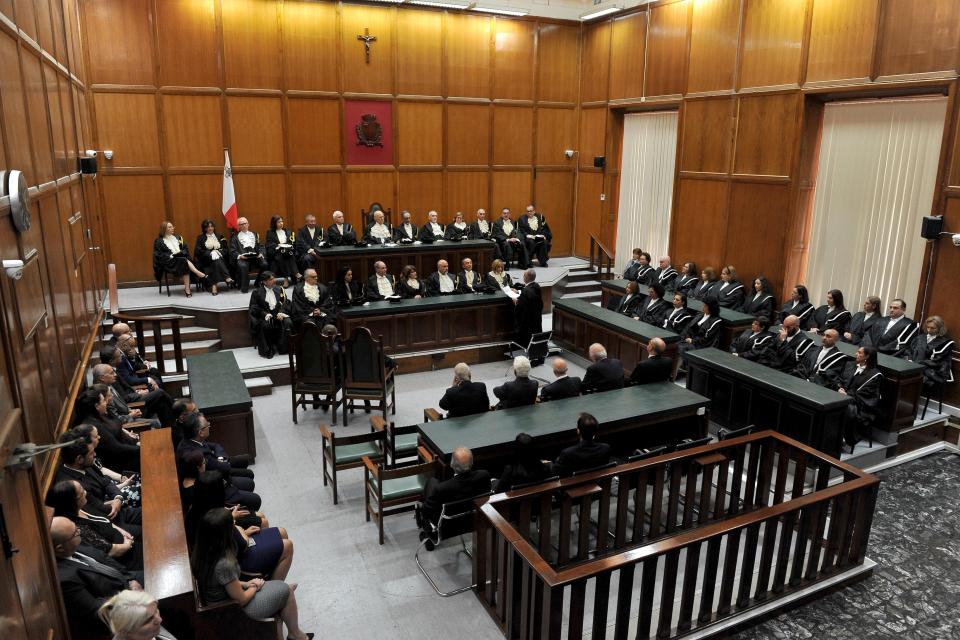
Minister for Justice and Reform of the Construction Sector Jonathan Attard on Monday launched a proposed bill to amend the Constitution of Malta, a judicial reform aimed, in his words, at “strengthening efficiency and increasing standards within the judiciary”.
As part of the proposed amendments, the government is introducing the role of an independent Commissioner for Standards of the Judiciary who would be appointed by the Commission for the Administration of Justice, and must be a retired judge or magistrate, or a non-practising senior lawyer.
This office will be tasked with investigating complaints of ethical misconduct and breach of professional standards of members of the judiciary and would occupy the role for three years.
The Commissioner must determine whether there is enough evidence at prima facie level, and if so, s/he can then investigate, summon witnesses, and draw up a report with conclusions.
The Commissioner for Standards of the Judiciary shall not make any finding of guilt or recommendation in respect of the person being investigated without giving the said member of judiciary access to all evidence and the right to be heard in a fair trial.
This report is passed on to the Chief Justice and the Justice Minister, and the Committee for Judges and Magistrates will decide the best course of action against the breach of ethics by a member of the judiciary, according to the report.
The Chief Justice and the Minister responsible for Justice may at their discretion choose not to follow the report of the Commissioner for Standards of the Judiciary. If the Commissioner decides not to investigate an allegation, s/he shall inform the person who made the allegation in writing, as well as the Chief Justice and the Justice Minister, stating the reasons for such decision.
Citizens will be able to submit complaints or request investigations on complaints of ethical concerns, directly to the Commissioner, bypassing the Justice Minister or the Chief Justice, thereby reinforcing the impartiality and accessibility of judicial oversight, Attard said.
Attard, along with government Whip Naomi Cachia, presented the proposed bill in a press conference on Monday, which will then be discussed next week in Parliament, requiring a two-thirds majority for the bill to pass.
Cachia said that in the past days, government has met with the Opposition and explained the proposed bill, with the Opposition saying that it needed to discuss the bill internally.
She appealed to the Opposition to support government on the proposed bill for a consensus on these reforms.
Attard said that the proposed bill’s aim is to increase efficiency and standards in the justice sector and makes part of a necklace of reforms in the justice sector since 2020.
He said that the proposed amendments came after listening to and consulting with the Chief Justice, as well as appeals by the justice sector itself for such reforms.
The bill also proposes clear constitutional provisions regarding the appointment of the Auditor General, in line with the procedure applicable to other Constitutional offices which require a vote in favour of two-thirds of the members of the House.
In cases where Parliament fails to reach a two-thirds majority on a new appointment, the sitting Auditor General would remain in office until consensus is achieved, to avoid an impasse.
The amendments also provide the removal of the exclusion of judges and of the Chief Justice from being appointed to the office of the President of Malta, Attard said.
Another proposed amendment is for the establishment of three sections of the Constitutional Court, the Constitutional Court (First Section), the Constitutional Court (Second Section) and the Constitutional Court (Third Section), every which section shall be presided by the Chief Justice.
Moreover, government is also proposing the possibility for a Judge of the Superior Courts and a Magistrate of the Inferior Courts to remain in office until the age of 70 years old, extending the age of retirement, subject to the approval of such extension of tenure by the Commission for the Administration of Justice, Attard said.
Those interested in remaining in office until the age of 70 must inform the Chief Justice and the President of Malta before reaching the age of 68, who will then communicate this interest to the Commission for the Administration of Justice for its approval of the continuation in office.
The bill also provides for a change in the procedure for the determination of complaints against members of the legal professions in order to provide for time limits which are more feasible – that of an initial six months, with the possibility of a further six-month extension.
The government is also proposing the renewal of the framework governing disciplinary proceedings against Judges and Magistrates through the Commissioner for Standards of the Judiciary.
The bill also proposes that instead of publishing the three names of candidates eligible for appointment of becoming a new member of the judiciary, after consultation with the Chief Justice, the government is proposing that these names are kept in a permanent registry which is kept secret, but must be accessible to the Committee members, the Prime Minister and the Opposition Leader.
The bill also proposes an amendment in line with the rule of law of the European Commission, which is to allow the Prime Minister to consult with the person who is occupying the role of Chief Justice at that time, as the President and representative of all the judiciary and with the President of Malta, who has the role of leading the Commission for the Administration of Justice on the choice of person to appoint as Chief Justice.
The Prime Minister must then make a declaration in Parliament in which he confirms the consultation.












